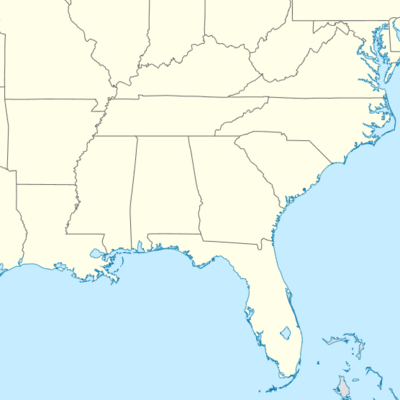Southern Ivy
Southern Ivy is a term used to describe a university in the Southern United States that is comparable to a university in the Ivy League, usually from the perspective of having a similar level of academic quality or social prestige.[1][2] Unlike the Ivy League, which is an established group of eight universities in the Northeastern United States, there is not a fixed standard for what constitutes a Southern Ivy, and different sources may list different universities, depending on their criteria. The term "Southern Ivy League" is also used to refer to a proposed athletic conference that would have included several Southern Ivies.
List of universities
[edit]The following universities have appeared in lists of Southern Ivies and top-ranked universities in the Southern United States.
Proposed athletic conference
[edit]Following World War II, many small private universities, such as Vanderbilt, began to struggle to compete against larger public universities in American football.[6] In the Southeastern Conference (SEC), the Vanderbilt Commodores, which had fielded competitive teams in the early 20th century, struggled against other teams and by the 1940s was running a deficit in its athletics department.[6] In the late 1940s, Vanderbilt Chancellor Harvie Branscomb hoped to reposition the university's football team as a more low-budget program by creating rivalries with Ivy League universities, and to this end he scheduled a 1948 game against the Yale Bulldogs football team.[7] However, when Vanderbilt team beat the Bulldogs by a score of 35–0, Yale declined to play any further games against the Commodores.[7]
Around 1951, Branscomb attempted to organize a new athletic conference that would have been a Southern equivalent of the Ivy League with universities such as Duke, Rice, Tulane, Virginia, and Washington University in St. Louis joining Vanderbilt, though the effort failed, prompting Branscomb to remark that his university was "located in a spot where ivy does not seem to flourish.[8] Later that year,[8] Branscomb proposed a series of changes to the SEC's regulations that would have helped Vanderbilt's teams, but these were rejected by the administrators of the other universities in the conference.[9] In the late 1950s, Branscomb secretly held a meeting with the presidents of five other Southern universities (Duke, Georgia Tech, Rice, Southern Methodist, and Tulane)[10] to discuss forming a new conference, referred to as either the "Southern Ivy League" or the "Magnolia Conference".[11] However, the proposed conference never came to fruition.[11] In the cases of Duke and Georgia Tech, the two universities did not want to jeopardize their in-state rivalries against the University of North Carolina and the University of Georgia, respectively, while Rice and Southern Methodist did not want to give up their share of income from the Cotton Bowl Classic.[10] While discussions of a Southern Ivy League persisted, often including Duke, Rice, Southern Methodist, Tulane, and Vanderbilt, the conference never materialized,[12] and by the early 1960s, the plan had been retired.[13]
References
[edit]- ^ a b c d e f g h i Morgan 2014, p. 108.
- ^ a b c d e f g h Ainsworth 2013, p. 873.
- ^ a b c d e f g h i j k l m n o p q r s t u v w x y Saul 2022.
- ^ a b c d e f g h i j k l Carlton 2024.
- ^ a b c d e Delery 2017, pp. 64–65.
- ^ a b Carey 2003, pp. 219–220.
- ^ a b Carey 2003, p. 221.
- ^ a b Mohr 1997, p. 51.
- ^ Carey 2003, pp. 221–222.
- ^ a b Carey 2003, p. 222.
- ^ a b Papillion 2022.
- ^ Walsh 2006, p. 18.
- ^ Mohr 1997, p. 52.
Sources
[edit]- Ainsworth, James, ed. (2013). Sociology of Education: An A-to-Z Guide. Vol. 1. Thousand Oaks, California: SAGE Publications. p. 873. ISBN 978-1-4522-7614-4. OCLC 847526825.
- Carey, Bill (2003). "Harvie Versus the Football Team". Chancellors, Commodores, and Coeds: A History of Vanderbilt University (1st ed.). Nashville, Tennessee: Clearbook Press. pp. 219–223. ISBN 978-0-9725680-0-5. LCCN 2002096716. OCLC 51755981.
- Carlton, Genevieve (August 16, 2024). Miller, Danika (ed.). "The Public Ivies, Little Ivies, and Other Ivy League Equivalents". BestColleges. Red Ventures. Archived from the original on December 17, 2024. Retrieved December 20, 2024.
- Delery, Clayton (2017). Out for Queer Blood: The Murder of Fernando Rios and the Failure of New Orleans Justice. Foreword by Robert L. Camina. Jefferson, North Carolilna: Exposit Books. ISBN 978-1-4766-6884-0. OCLC 1007499105.
- Mohr, Clarence L. (1997). "World War II and the Transformation of Southern Higher Education". In McMillen, Neil R. (ed.). Remaking Dixie: The Impact of World War II on the American South. Jackson, Mississippi: University Press of Mississippi. pp. 33–55. ISBN 978-0-585-03304-4. OCLC 42330019.
- Morgan, Genevieve (2014). Undecided: Navigating Life and Learning After High School. San Francisco: Zest Books. ISBN 978-1-936976-32-4. OCLC 856567356.
- Papillion, Jude (September 23, 2022). "Why Tulane left the SEC". Tulane Hullabaloo. Archived from the original on December 11, 2023. Retrieved December 20, 2024.
- Saul, Derek (April 14, 2022) [August 15, 2019]. "25 Top Colleges And Universities In The South 2019, Ranked By Academics And Outcomes". Forbes. ISSN 0015-6914. OCLC 6465733. Archived from the original on April 21, 2024. Retrieved December 20, 2024.
- Walsh, Christopher J. (2006). Where Football is King: A History of the SEC (First Taylor Trade Publishing ed.). Lanham, Maryland: Taylor Trade Publishing. ISBN 978-1-58979-355-2. OCLC 64335804.


